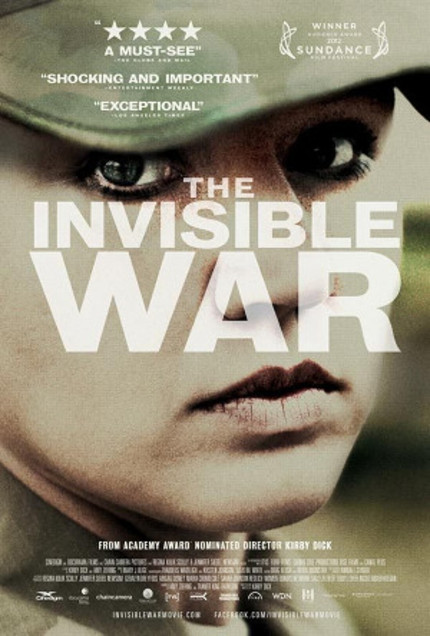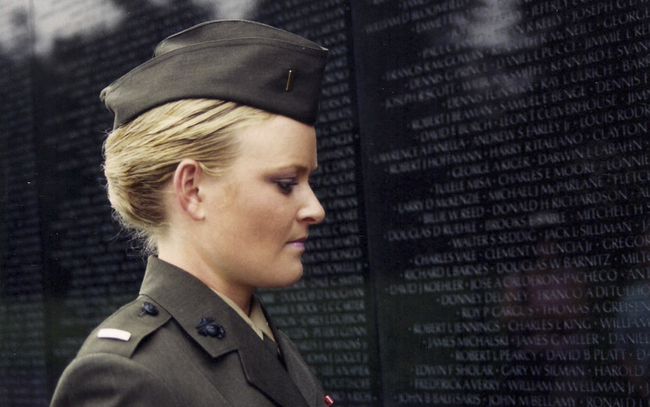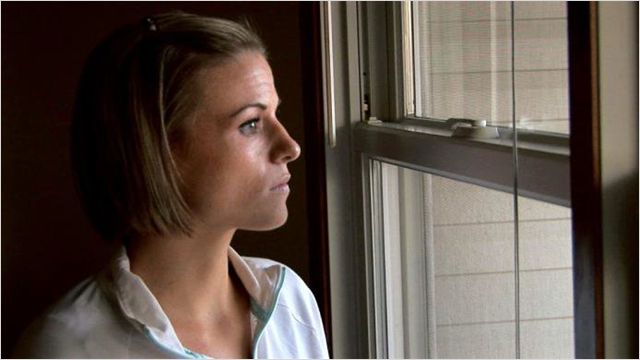Rape as Occupational Hazard: THE INVISIBLE WAR Director Kirby Dick on Exposing the U.S. Military's Shameful Cover-up

Occasionally a documentary manages to attract enough attention that it begins to trickle into our collective conversation, perhaps even holding sway for some kind of proactive social response. One hopes that the impact of director Kirby Dick's (Twist of Faith, This Film is Not Yet Rated) latest effort, The Invisible War, is incendiary enough to spark a full-fledged political firestorm.
The recent Sundance Audience Award winner is an exhaustive yet utterly compelling look into the staggering rape epidemic in the U.S. military as well as its appallingly unjustifiable culture of non-response, reeking of institutionalized cover-up. Of particular note is how the film explores the chillingly high instance of predatory serial offenders, those enemies within the military's midst who repeatedly manage to perpetrate their crimes unabated and relatively unhindered in a target-rich environment. "There are systems put in place to help women get raped better," observes one ex-soldier.
Following a screening at Toronto's Hot Docs Film Festival, I had the opportunity to speak with the director about the film which has already managed to become the catalyst for policy reform in the U.S. military.
ScreenAnarchy: This film is an enormous investigative undertaking. What drew you to it?
Kirby Dick: Initially, it was the percentage of men and women in the
military who are assaulted. The numbers are so staggering: Over 20%
of women are assaulted during their time in the military. This information
has been covered up for so long and it has been going on for several
generations. Not only had there been no feature film, but there had been no
comprehensive book on the subject. It was just completely unknown, certainly to
the U.S. public.
We started talking to the survivors about their experiences, these incredible people who believed in serving their country. They went in incredibly idealistic and wanting to have a career in the military and then were assaulted, which was devastating enough, and then had enough belief in the system to come forward and when they came forward the system turned on them. The trauma of that experience is so severe, so pronounced, and tragic. We were personally committed to making a film that would not only get the story out, but would try to change policy for the future.
Did you experience any resistance or lack of cooperation from the government?
No. I was concerned as I was doing the investigations,
though, not so much that the government would come after me but we are telling
stories that involve psychopaths. All of our subjects were threatened [by their
assailants] with their lives if they were to come forward and in some cases... [Pauses]
Well, I'll leave it at that. I was concerned.

The film's opening sequence shows iconic, familiar images of cheerful women serving on the home front during World War Two, in stark contrast to the women featured here. Has it gotten worse for women in the military or has there just been a shift in culture?
Over the course of the last 50 years I think it's gotten slightly better.
In terms of the numbers of assaults going down?
Yes. The anecdotal stories we would hear from the 70s,
80s, and 90s, were so unbelievably horrific... That doesn't mean that the numbers
have gone down, however. Until the military has a policy of investigating, prosecuting, and incarcerating serial
perpetrators who are repeatedly assaulting fellow soldiers the problem
will continue.These people are enemies within.
Is there another national model that would work better for the U.S.? You alluded to that at the end of the film and I couldn't help but wonder about Israel. I imagine the percentage of women in their military to be higher than in the U.S.
I don't have the numbers and what's very interesting about all this is that it's very difficult to get the numbers from anywhere. I'm sure it's a problem in all militaries, to some extent, and I am sure that all militaries, like the U.S. military, are doing to do everything they can to keep it covered up.
This is one of the things we hope that the film will do - not only spark the debate in the U.S. but in each country that it plays in. As far as the Israeli military I would anticipate it is less of a problem because there are more women, but on the other hand I was speaking with somebody just the other day who was saying that her research showed it to be a very significant problem.
Canada has a much better policy when it comes to the decision to prosecute: It's no longer the unit commander who makes the decision, it's taken outside the chain of command and it's a completely independent body [that makes the decision]. That's a huge difference and something we're advocating in the U.S.

The male perspective, from the husbands, fathers, brothers and sons of these female victims is incredibly moving. There was a real sense of balance in seeing that, and it was compounded by many of them also being in the military. Trauma isn't something that just affects an individual but impacts everyone around the victim.
In the military, most men are horrified by this. I didn't want people to look at the film and identify with it as a problem if you are a woman and then be defensive if you're a man. Sexual assault is a problem in society that has to be solved -
For both genders. You make the connection in the film about homophobia; when we think of male-on-male sexual assault I think most people think about prison and not the U.S. military.
Yes, thank you.
During the interview with the Rear Admiral - his ears were very red. I assume there was no color correction involved.
[Laughs] Yes, that is considered a "tell."
As far as I am concerned these people are spokespeople, to evade and deflect the press. The real decisions and the real people with responsibility are much farther up the chain of command.
As for color correction, I made every attempt to light these people as well as possible, out of respect. He was sweating. They put us in this room, it was hot, and I had the AC blasting until we started the interview. I was actually trying to mitigate that situation.
Was there ever a moment during filming where you thought, "OK, this is it, here's the turning point"?
Every time we'd do an interview. I would think, "I can't believe I am hearing this again, another tragic story of injustice." In many ways it is the interviews with the survivors, I think, that are the soul of the film. I just remember every time I'd walk out of an interview swearing about how an unbelievably courageous and idealistic person was just destroyed by something they believed in.
In our film we have a woman saying [how] she was a single woman, raped by a married man and she was charged with adultery. This is very significant in the military - nobody does, but you can get up to twenty-six years in prison for that - it's no small thing. We, personally, heard that story three times. We would hear the same things, over and over. We would hear about the way that these serial perpetrators would befriend then try to plot and stalk their victims. Right as these women would tell their narrative, I could see what was coming, because I'd heard it so many times before.
What about pregnancy, or women who are either discharged or leave?
There's no way to get statistics of why women leave the military, or if they were driven to commit suicide because of threats, or are killed because their perpetrator was afraid [of being "outed"] so perhaps a homicide was staged to look like a suicide. There's all these statistics that the U.S. military has not undertaken to find out.
We barely ever hear mention in the media about those few servicemen who are ultimately tried or convicted. Is that on purpose?
I think so. The media has given a huge pass to the military in the U.S. For a long time the media would only report on these as individual issues, they would never look at the broad systemic problem or they would buy the military's [PR] line.
I think a lot of that is changing because of the film. Reporting has increased tenfold since the film came out at Sundance.
As this film is released and becomes part of a growing dialogue, what do you think could happen?
Things are already happening, it's quite incredible. It has already been announced [in January] that the commander no longer has the decision to prosecute and that that decision has to be moved up the chain of command to the level of colonel. It's a problem because it's still in the chain of command, and there are a lot of opportunities for conflicts of interest. It should be moved higher or, preferably, outside the chain of command like the Canadian system. Regardless that's a really important first step and we feel that the film played a large role in that.
There was no reason for the administration to act now. I think that President Obama is running on women's issues and women's rights. He would be very vulnerable if the press asked him, "You say you believe in women's rights and protecting them, but the women that you have the most authority over in your own military, why haven't you taken action yet?"

Has President Obama seen the film?
No, but I know people close to
him have. Quite a few.
In one scene, one of your subjects [Kori Cioca], strongly counsels a woman not to join the military because of her own traumatic experience. Should women join the military in America? Is it a good place for a woman to go?
Right now, there is a very significant problem that has yet to be addressed.
Yes. An "occupational hazard."
It is. That's the reality of it. It's better for the military and better for the country if women are in the military, but I think it is a real risk. Change starts with the truth, and that is the truth.
The Invisible War opens wide in the U.S. on Friday, June 22.







